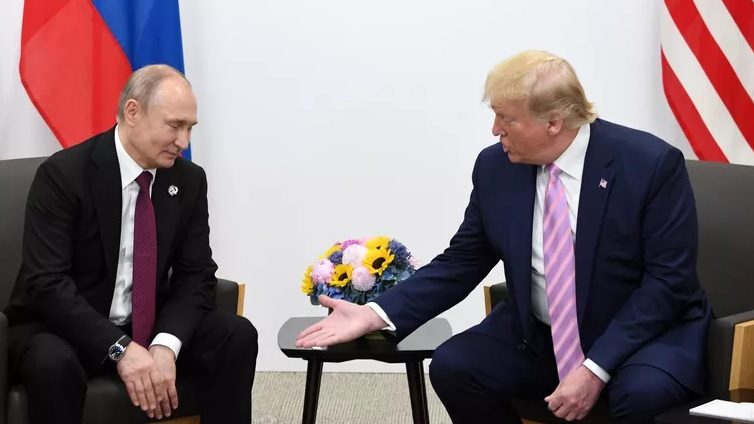 Vladimir Putin and Donald Trump. First meeting.
Vladimir Putin and Donald Trump. First meeting.
Photo: RIA Novosti
With the possible exception of China, no issue will figure larger on the foreign-policy agenda of the incoming Trump administration than Russia, writes at ‘The Hill’ Thomas Graham, a distinguished fellow at the Council on Foreign Relations, who was the senior director for Russia on the National Security Council staff during the George W. Bush administration.
In the last three years, relations have plunged to depths of animosity not seen since the darkest days of the Cold War. Episodic phone calls between senior officials to head off crises are no substitute for sustained, substantive dialogue between the world’s two leading nuclear powers.
The restoration of more regular diplomatic relations is urgent. This is not a call for a reset, which is neither possible nor desirable: The clash of interests is too profound for it to be otherwise. The task, rather, is to transform a dangerous adversarial relationship into one of competitive coexistence, in which clashing geopolitical interests can be managed responsibly. Reaching that goal will require skill, tenacity, patience and resolve.
To his credit, President-elect Trump has indicated that he wants to restore relations, at least to the point where it becomes possible to resolve the Russian-Ukrainian war in short order. He will find that the progress will not be quick, nor can his goal be reached unless it is embedded within a broader Russia agenda that includes such issues as strategic stability, European security, the Middle East, Northeast Asia, the Arctic and energy markets. The new administration will need a Russia policy, not just a Russian-Ukrainian war strategy.
That will take time. Trump should resist the temptation to have an early face-to-face meeting with Putin. The Russian ruler would welcome one as evidence that the Western effort to isolate him diplomatically has failed. Trump should want to get something in return for taking that step. It should come in the form of substantive summit outcomes that move relations forward while advancing American interests. That will not be possible without adequate preparation. At the same time, Trump also needs to indicate early on that he intends to restore regular dialogue.
How then should the new administration proceed?
Shortly after his inauguration, the new president should make a phone call to Putin to pass along two messages: First, that the U.S. does not seek Russia’s strategic defeat or regime change in Russia. Rather, the U.S. recognizes that Russia will remain a pillar of any future world order. For that reason, the two countries need to restore more normal diplomatic relations. And second, he must communicate that while a summit meeting is desirable, it should not take place until the two presidents can announce an agreed framework for managing relations and for resolving the Ukraine conflict.
With that in mind, he should send his special envoy for Russia and Ukraine, Keith Kellogg, to Moscow to begin preparations, including agreement on a summit date by summer 2025. On the proposed agenda should be the following:
European security/Ukraine. Kellogg should bring ideas about how to stabilize the long NATO/Russia frontier, which now extends from the Barents Sea to the Black Sea, and how to deescalate the mounting hybrid war between Russia and the West. He should also bring a preliminary framework for resolving the Russian-Ukrainian war.
Strategic stability. It is too late to develop a follow-on treaty to the New START agreement, which will expire in February 2026. But the countries have a mutual interest in agreeing on how to manage their nuclear relationship in the future. The two countries with the deepest experience in nuclear affairs and strategic thinking should undertake joint work on a new concept of strategic stability that takes into account the shifting strategic landscape and new technologies.
The Middle East. The spreading instability in the region raises questions of mutual concern: nuclear proliferation, a resurgence of terrorism and energy security. The ouster of Syrian President Bashar Assad only fuels the instability, even as it upends Russia policy in the region.
Northeast Asia. Russia’s new defense relationship with North Korea has implications for stability on the Korean peninsula. The U.S. should make clear to Russia what it is doing in the region, particularly with its Japanese and South Korean allies, to ensure that deterrence prevails.
The Arctic. With the opening of the Arctic due to global warming, the two sides should discuss how to manage the mounting security competition there.
The two sides would then work on these issues to produce a substantive summit.
Trump should meet with the key U.S. allies in advance of any meeting with Putin. Having the allies on board with a broad approach to Russia will enhance U.S. leverage in the run-up to a U.S.-Russian summit.
Finally, the two presidents should meet. They should be able to announce frameworks for managing U.S.-Russian relations and resolving the Russian-Ukrainian war. Those frameworks would provide the meat of a joint statement; but, taking a page from the 1972 Shanghai communique, which laid the ground for the restoration of U.S. relations with China, the joint statement should lay out clearly the points of contention between the two sides. As with the earlier communique, a candid articulation of differences would lend greater credibility to the few agreed areas of cooperation.
After the summit, a long road will lie ahead in building less perilous U.S.-Russian relations, but at least there will be a road.
read more in our Telegram-channel https://t.me/The_International_Affairs

 11:47 24.12.2024 •
11:47 24.12.2024 •






















